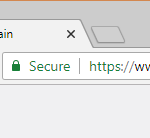TLS, SSL, HTTPS. TLS vs SSL. SSL vs HTTPS. Acronym soup. The world of website security acronyms can be almost as annoying as that Deangelo Vickers character from the TV show “The Office” if you’re just getting to know about it. Although Deangelo Vickers will always win this battle, in my opinion, at least we can turn him off and watch something else.
But when it comes to the acronyms and lingo of the cyber security industry, there’s no option but to learn suck it up and learn them. So, let’s get started by talking about each and what the difference is between SSL and HTTPS, and where TLS fits in.
Read more...


